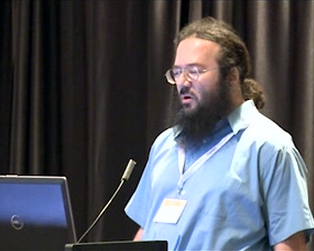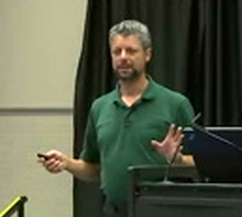CppCon 2014 Creative Coding with C++--Andrew Bell
 While we wait for CppCon 2015 in September, we’re featuring videos of some of the 100+ talks from CppCon 2014. Here is today’s feature:
While we wait for CppCon 2015 in September, we’re featuring videos of some of the 100+ talks from CppCon 2014. Here is today’s feature:
Creative Coding with C++
by Andrew Bell
Summary of the talk:
Realtime graphics, computer vision, hardware hacking, and audio synthesis are just a few of the crafts that fall under the banner term of "creative coding". In this session we'll talk about some of the creative projects putting C++ in places you might not expect it - everywhere from the Smithsonian's permanent design collection to robotic Coca-Cola dispensers on California beaches. We'll look at a wide spectrum of projects ranging from those of the "maker" community to commercial work from full-time professionals earning their livings in advertising and design agencies. And finally we'll take a look at how you can use the C++ you already know to jumpstart your own creative coding projects using the open source toolkit Cinder.

 On Thursday the 26th of March at Tuenti's HQs in Madrid, Spain.
On Thursday the 26th of March at Tuenti's HQs in Madrid, Spain. While we wait for CppCon 2015 in September, we’re featuring videos of some of the 100+ talks from CppCon 2014. Here is today’s feature:
While we wait for CppCon 2015 in September, we’re featuring videos of some of the 100+ talks from CppCon 2014. Here is today’s feature: While we wait for CppCon 2015 in September, we’re featuring videos of some of the 100+ talks from CppCon 2014. Here is today’s feature:
While we wait for CppCon 2015 in September, we’re featuring videos of some of the 100+ talks from CppCon 2014. Here is today’s feature: While we wait for CppCon 2015 in September, we’re featuring videos of some of the 100+ talks from CppCon 2014. Here is today’s feature:
While we wait for CppCon 2015 in September, we’re featuring videos of some of the 100+ talks from CppCon 2014. Here is today’s feature: While we wait for CppCon 2015 in September, we’re featuring videos of some of the 100+ talks from CppCon 2014. Here is today’s feature:
While we wait for CppCon 2015 in September, we’re featuring videos of some of the 100+ talks from CppCon 2014. Here is today’s feature: While we wait for CppCon 2015 in September, we’re featuring videos of some of the 100+ talks from CppCon 2014. Here is today’s feature:
While we wait for CppCon 2015 in September, we’re featuring videos of some of the 100+ talks from CppCon 2014. Here is today’s feature: